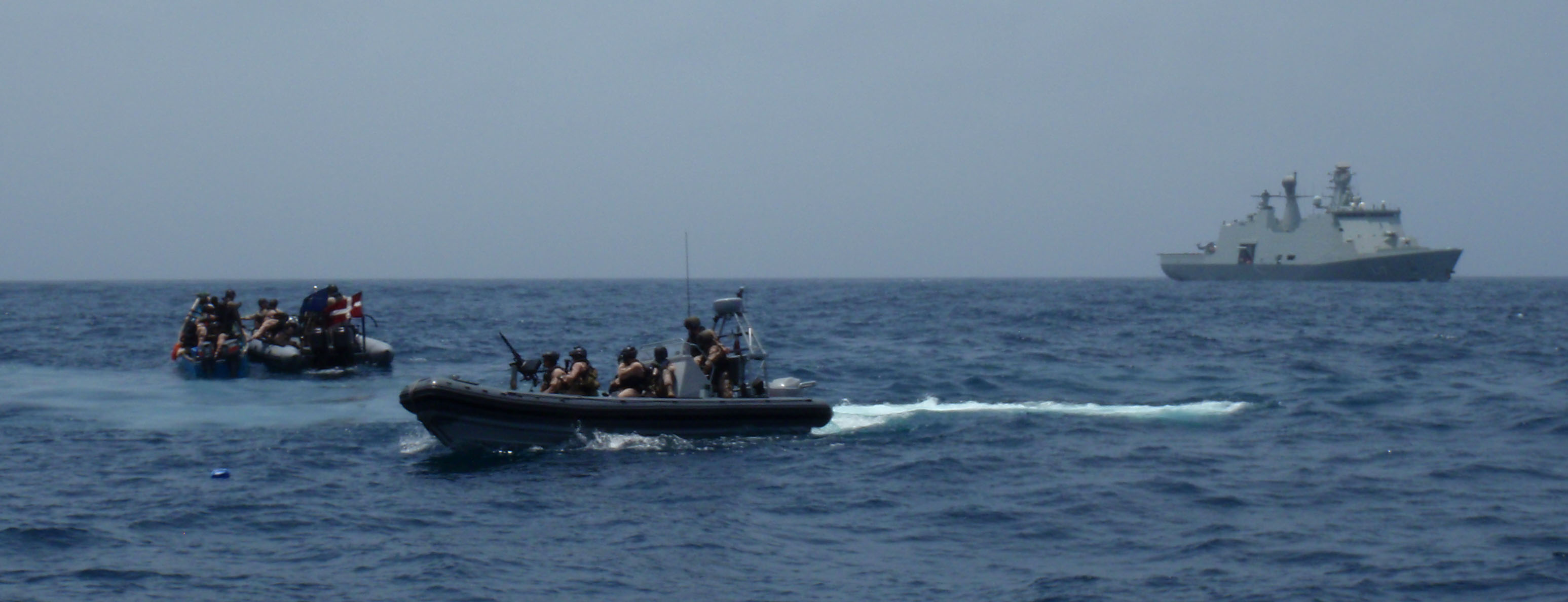Denmark wants to be more offensive on pirates. Its 2011-2014 strategy

(BRUSSELS2) Just before the elections (which took place on Thursday), the government of LL Rasmussen adopted a strategy against piracy 2011-2014. Interesting text because it translates for Denmark, a will always marked to have a more offensive approach, with possibly bombardment of the pirate bases and employment of the special forces to neutralize the pirate bases on the ground. It transcribes - in sometimes precise, sometimes more vague terms - its approach on various points: a continuity of military engagement with naval and air resources over the period, a guideline on the employment of private guards on board ships flying its flag, as on the prosecution of pirates in court, a contribution of 200 million crowns to the stabilization of the country… A fundamental question for the country of the little mermaid, which holds around 10% of world maritime traffic. Every day 20 to 40 ships flying its flag are in risk areas.
hit harder
Denmark undertakes to provide NATO's Operation Ocean Shield with a ship in the area for a period of 6 months as well as a maritime patrol aircraft for several shorter periods, to be defined.
But the Danes campaign above all for " a stronger mandate of the international effort, which could even go as far as target pirate equipment and facilities ashore ". These could be destroyed with " the use of precision-guided bombs (lasers or thermal). And if this is not possible - and in specific cases - the deployment of special forces could be envisaged ».
Certainly the risk and the cost of such operations must be weighed before any initiative, recalls the document. There may be a " risk for deployed troops and civilians alike ", not counting the " pirate hostage situation which could be made more difficult and dangerous". In addition, such initiatives would need to be endorsed by a large group of countries and (be) conducted in close cooperation with international partners, particularly within NATO”.
More offensive action can also be directed in hostage recovery operations aboard captured ships. These operations are already possible today under a national command with possible support from NATO” and which (normally) require obtaining “permission from known flag States to have crew members on board” the vessel concerned.
Frame the armed guards
Denmark no longer wants to use military forces on board Danish ships, except in exceptional circumstances. Armed military personnel have been used in the past on board Danish ships which had a specific purpose as they carried large quantities of military equipment for Danish troops engaged in Afghanistan or to accompany ships of the World Food Program for Somalia (teams rapid reaction units of the Thetis had then been deployed on board these boats). " This option should not be pursued (...) This would create an undesirable precedent. (...) It will not serve Danish long-term interests if these national protection tasks are carried out at the expense of international cooperation. Also, it is not cost-effective in the use of military resources. »
On the use of private guards, an evolution has occurred, recognizes the document. Denmark has been very reluctant to allow the use of private guards on Danish ships ". A position based on a reluctance in principle to grant private guards permission to use weapons but also because of fear of an escalation in the means used by pirates to capture ships ". But the Danish government admits to having an approach now “ more open " On the question ; evolution due to the extension of the radius of action of the pirates and the difficulty of the international maritime forces to be everywhere as well as to a strong pressure of the maritime industry. The shipowner will be able to submit an ad hoc request to obtain an authorization to carry weapons for private guards. The use of private guards on board shall not " not be longer than necessary to respond to an extraordinary and specific threat to the vessel in question ". " This is not a " long term solution “says the document. But it turned out that " the presence of armed guards provides effective protection against a pirate attack ". The government wants to ensure that the application procedure is not too bureaucratic but at the same time is worried about not being able to have personal data on the private guards used in an authorization to carry weapons.
Denmark also wants to advocate the use of “international guidelines for the use of private guards. Such guidelines should” prevent incidents where armed guards contribute to an escalation of the situation, thereby causing danger to the vessel and its crew. "
Prosecute hackers
Denmark had an agreement with the Kenyan government to be able to transfer pirates to trial; agreement expired since September 2010 (NB: Kenya has suspended or canceled all its international agreements preferring reception on a "case by case" basis, reception reduced to the strict minimum since then). He says he wants to continue to sign bilateral agreements with other countries (NB: the country does not benefit from the agreements signed by the EU with the Seychelles and Mauritius, not participating in the Atalanta operation).
Prosecution in national courts seems to be a popular solution in several countries. According to a report drawn up by the UNODC in March 2011, 946 people have thus been brought before the courts for acts of piracy in 18 countries around the world. But Denmark remains skeptical on a track discussed within the international working group: to also pursue the possession of piracy equipment (and not only the act of piracy). This provision could lead to a number of legal complications ».
The Danish penal code (§183) currently penalizes the act of piracy and allows the application of the ordinary rules of procedure. A provision never used to prosecute pirates should we specify. Denmark will set up a working group - made up of representatives from the Ministry of Justice and Foreign Affairs to “examine closely the provisions of national legislation relating to anti-piracy operations ". A review that will be carried out in conjunction with the work carried out in other countries (NB: France, Spain, Belgium, etc.)
Comment: Denmark shows an unwavering and resolute commitment against piracy. This document has the advantage of not avoiding certain delicate questions. However, one can only be struck by the more than ambiguous position of the small northern kingdom. It campaigns for the prosecution of pirates but has still not adapted its national law to do so and has, until now, never brought suspected pirates to justice unlike a dozen other countries in the world. (Germany, Spain, Netherlands, France in the EU). He is only now setting up a working group on the issue while piracy has been raging for 3 years. Danish ships that catch pirates almost always release them unless another country judges them. He advocates greater international cooperation but rarely considers it within the EU. It is true that Denmark benefits from an opt-out in terms of EU military missions; which is somewhat at odds with the temperament of the country deeply engaged in such military operations elsewhere.
consult the document in the B2 docs



